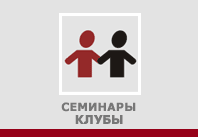Initially the club under the auspices of the Center grew out of discussions that followed every performance in the NA DOSKAH (On the boards).
In the mid-1980’s, at the beginning of the perestroika era, those discussions inevitably began to cover a wide range of issues stretching far beyond theatrical or cultural topics. Almost spontaneously they transformed into workshops, which soon started functioning on a regular basis. Their participants were scientists of different disciplines and political orientations.
By the early 1990's, workshops concentrated more and more on the issues of political science, the attendance grew immensely. As a result, in 1991, a political discussion club took shape, which was called Post-perestroika.
Post-perestroika club with its regular fortnightly seminars and unlimited access of public to the meetings, lasted for three years. A paper titled Field of Retaliatory Action was published in April 1993, which, to a certain extent, summarized the results of the Club’s work. It spelled out the key problems and the policy framework for the creation in Russia of a broad, consolidated pro-State opposition to the line, chosen by the then government.
However, by the autumn of 1993, it became clear that there was no viable and consolidated pro-State opposition in the country, and there was hardly a perspective to build one in the foreseeable future. One reason for that was the lack of willingness on the part of all the opposition political groups to strike compromises for the sake of meaningful synergies. The other – the lack of a broad and deep understanding of Russian and global trends by the opposition leaders, which is an unavoidable condition for such political trade-offs.
This is why in the fall of 1993, Sergey Kurginyan created a narrower informal
Substantial Unity club. The main objectives of this club became the analysis of key political, social, economic, ideological, and other processes in Russia and in the world, cultivation of methodological skills of integral political analysis in the intellectual community of the country, including the leadership of the opposition groups.
The development of the political process in the country soon proved that this methodological approach was in demand. Already the first meetings of the new club found well-known opposition politicians, as well as important representatives of the new government sitting next to each other at the Club meetings.
Since then, for almost 20 years, the Substantial Unity club has been meeting twice a month.
Reports of the club, as a rule, are available only to its permanent members and guests (although the composition of the club is changing with time). However, some reports that the Kurginyan Center believes useful to be provided to the general public, are released to the media or made available in the electronic form.
In 2001, in parallel to the Substantial Unity club, the
Youth Debate Cinema Club started its work under the auspices of the Center. It also meets twice a month and provides the floor for the discussion of modern intellectual cinema.
The Essence of Time is an all-Russian public movement centered in Moscow. It has branches in a number of Russian regions.
The history of its emergence is as follows. In the summer of 2010, at the Fifth Federal TV channel the historical show
Verdict of Times was launched. The main idea of the program was to assess various aspects of the most critical events in Russian history. In the confrontation with the negativistic liberal approach Sergey Kurginyan defended the historical values of Russia, both of the Soviet and the prerevolutionary period. The program was broadcast five days a week/ It caused a wide response, revealed the presence of massive pro-Soviet sentiments in the society (voting on the air showed that on all issues 75 to 96 percent of the audience supported Sergey Kurginyan’s stand).
Later, Sergey Kurginyan started his own series of Internet broadcasts, the
Essence of Time. In his lectures he examines in detail what has happened to the country since the breakdown of the USSR in 1991, analyzes the reasons for the collapse of the Soviet Union and is looking for methods to reconstruct the country and revive the meanings pursued by the people who were carrying out a great communist project.
In 2011, like-minded people, uniting around the Essence of Time Internet program, formed a virtual club, which gradually began to take shape, and to assert itself in real life in a form of a movement.
The number of its members increases continuously. More than 17 000 people have joined it across the country. Day by day, the movement is becoming more widespread and organized, brings together people of all ages and a variety of views. About three thousand activists work in the movement.
Activities of the ET include educational; socio-political; analytical; research areas and political journalism.
Main areas of expertise are political processes in Russia and abroad; social processes in Russia; alternative models of social development; historical heritage of Russia, including the Soviet period in its history; cultural and social trends in the society; analysis of the threats for/the factors of influence on the territorial integrity of the Russian Federation, etc.
Under the auspices of the Kurginyan Center there works a permanent international Seminar, Fundamental Conflicts in the 21st Century, launched on the initiative of the Russian and Israeli politicians and political scientists in December 2001. The seminar assembles on a yearly basis and covers wide range of issues, relating to international security. Renown politicians and academia experts were among speakers at the seminar’s sessions.












